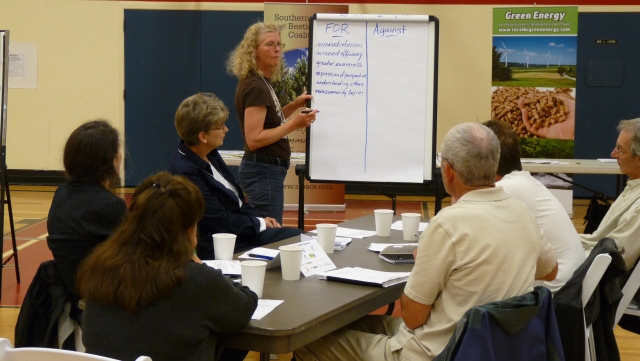Rural communities find their voice at summit
Growing sustainable communities was the focus of last week’s B.C. Rural Summit held in Grand Forks for the first time.
The conference aims to highlight challenges and advantages for rural communities.
“A lot of the resource based economies in the province and all the regions of the province are looking for ways to diversify,” Labourdais continued. “That boom and bust cycle is really challenging for rural areas. So diversifying their economics so that boom and bust is not such a spread from the peak to the crash is important. Tourism…has economic potential for creating employment and economic activity in rural communities.”
A community is selected every two years to host the summit in different parts of the province. The Regional District of Kootenay Boundary (RDKB) and Community Futures Boundary stepped up to host this year’s event.
“Not only do people get to participate, but also people travel from around the province to see what’s going on in different regions and what are the issues – which are often very similar we find from one part of the province to another,” explained Maureen Labourdais with the B.C. Rural Network, the founders of the event. “We strived to get a diversity of speakers on social, economic, environmental and cultural. The theme was building sustainability so we had all the different dimensions.”
The Aboriginal Tourism Association of B.C. was a sponsor this year, and Labourdais said there are significant advantages for communities to work with their neighbours to increase the attraction.
About 115 people took part in the two-day conference that opened on Thursday, Jun. 7 night with a welcoming evening at the Christina Lake Welcome Centre and continued through Saturday offering an array of workshops for participants.
“This my first time attending the summit and I found people seem engaged, inspired, and connecting with new networks with the hopes of improving the fabric of their own communities. Providing opportunities to hear from experts in the field and conversing with those who share common issues and challenges, often gives passage to viable solutions,” said Marji Basso, New Democratic Party candidate for the Boundary – Similkameen region who attended part of the event.
“The final plenary session was extremely significant to me – of the eight working groups consisting of various stakeholders, organizations, and elected leaders, fifty percent identified a common issue that needed to be addressed in rural communities: the challenge of creating effective community networking and new revenue opportunities in order to address the reality of having to do more with less.
In the workshops presenters shared their experiences with projects around the province and challenged participants to think differently about the options for their own areas.
“It was very educational. The networking and some of the groups and outcomes from the groups was a real positive and rejuvenating,” commented Marguerite Rotvold, Village of Midway councillor. “Even though Midway is innovative as a small community, I think there are improvements to be made all the time. It was really well worth it!”
Some of the presentations informed on existing services in the region like Invest Kootenay, while others provided ideas for joint ventures or connected people with resources.
“Part of these conferences is running into people who you find really inspire you,” said RDKB director Kathy Wallace of Rossland. “Out of (a workshop on heritage) I have an idea for a partnership between Rossland, Trail and Warfield for a sign program and telling the story of the trail from the Rossland gold mines and the smelter in Trail. So I’m going to take that home.”
Established in 2004, The BC Rural Network is a coalition of organizations, communities, and individuals who share a commitment to building the capacity of British Columbia to develop responses to rural and remote community issues.
The need and desire to improve networking and exchange of information among rural communities has been clearly identified and requested by rural stakeholders across B.C.
“It gives you a bit of support to know that you’re all facing similar challenges and that you have a network that you can operate and draw from,” Wallace concluded.
Link:






















